204 | Aggression Isn’t Always Anger: Decoding Aggressive Play in Child-Centered Play Therapy
In this Session Savvy episode of the Play Therapy Podcast, I explore a common misinterpretation in child-centered play therapy: assuming that aggression in a child’s play is rooted in anger. While aggression may appear linked to anger, it’s essential not to make that assumption unless the child explicitly communicates it verbally or through non-verbal cues. I dive into the various reasons behind aggressive play—such as seeking power and control, releasing anxiety, or enacting justice—and explain why therapists should carefully assess the root cause before reflecting emotions.
I offer practical guidance on how to track behavior when unsure of the emotional root, ensuring therapists don’t default to labeling it as anger. By taking a moment to analyze the child’s behavior and the themes present, we can make more accurate emotional reflections and deepen the therapeutic process. This episode challenges us to move beyond surface-level assumptions and truly understand the underlying emotions in aggressive play.
Sign up for my exclusive newsletter at playtherapynow.com. Stay ahead with the latest CCPT CEU courses, personalized coaching opportunities and other opportunities you need to thrive in your CCPT practice!
Ask Me Questions: Call (813) 812-5525, or email: [email protected]
Brenna’s CCPT Hub: https://www.playtherapynow.com
CCPT Collective (online community exclusively for CCPTs): https://www.ccptcollective.com
Podcast HQ: https://www.playtherapypodcast.com
APT Approved Play Therapy CE courses: https://childcenteredtraining.com
Twitter: @thekidcounselor https://twitter.com/thekidcounselor
Facebook: https://facebook.com/playtherapypodcast








